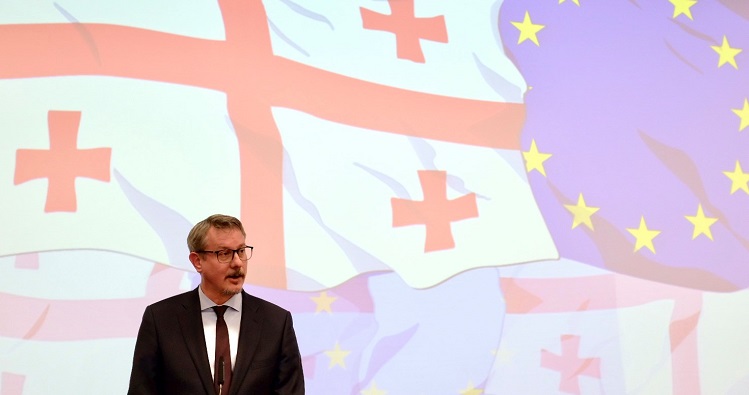EU welcomes Georgia’s anti-crisis plan, urges clear gender analysis during pandemic

The European Union delegation has released a statement on gender equality and the protection of vulnerable groups in Georgia in the Covid-19 context. Photo: EU in Georgia press office.
The European Union delegation to Georgia has welcomed the government of Georgia's anti-crisis plan and said that a clear gender analysis will be crucial to Georgia’s ‘successful handling’ of one of the negative key side effects of the coronavirus pandemic.
- Georgia to benefit from EU financial support for socio-economic recovery during coronavirus outbreak
The statement says that the coronavirus pandemic is an ‘unprecedented challenge’ that has forced countries, citizens and governments to ‘drastically change’ the way of living.
Its negative effects are particularly hard for people in vulnerable situations. The immediate and necessary measures adopted to address the health and economic challenges should not leave anyone behind, including those already living below the poverty line, internally displaced persons and persons with disabilities, victims of gender-based and domestic violence and people and children living on the streets,” the delegation of the European Union to Georgia said.
The statement reads that the EU and its member states are supporting the Georgian government and a number of state and civil society organisations in their actions to help those most affected by the pandemic.
Grants provided to civil society organisations, including through the so-called Rapid Reaction Mechanism, allow them to provide immediate support to vulnerable groups. In a crisis like this, all parts of a democratic society play a crucial role, wherefore an enabling environment for a pluralistic civil society is more important than ever. No one is immune to the effects of this pandemic and no one should be left behind,” said the statement, adding that gender equality is a founding principle and core value of the European Union.
The statement notes that quarantine and isolation policies, coupled with financial stress, imply a clear risk for continued and increased gender based and domestic violence in all parts of society.
Special attention also needs to be paid to all children, ensuring their safety and equal access to health and educational opportunities. At the same time, no efforts should be spared to ensure that, in this challenging time, people with disabilities are granted proper medical care and education, economic support, and protection from any possible discrimination, said the statement.
The European Union’s delegation to Georgia says that they welcome the crisis communication action plan adopted by the Georgian Government to raise awareness about state services and the available support it has rendered to ease the hardship that families, individuals and communities are experiencing.
It is positive that support services, such as the 112 line and shelters remain available to victims of gender based and domestic violence with adjustments made to the crisis situation. Further measures, such as the awareness raising of citizens of their fundamental human rights and obligations, as well as the building of trust in state support and effective responses to cases of violence are also welcomed,” the statement stated.
The statement also mentioned the ‘heavy burden’ many women are taking on during the crisis, working at the front-line in the sectors most challenged by the virus, such as healthcare and social services.
 Tweet
Tweet  Share
Share